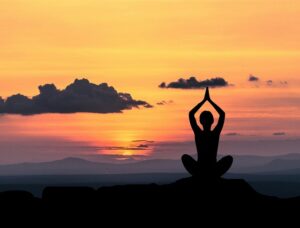It was 6 A.M. I was in the kitchen drinking my apple-cider vinegar and water before I headed to the gym to do some cardio. My husband came in and asked if I could make him a cup of coffee because he wanted to go to the gym too. I was surprised that my husband would want to exercise at this hour. I should have been delighted, but I was not. The truth is my husband needs to 2-3 cups of coffee in order for his engine to start. I had no problem making him a cup of coffee, but I was ready to go and eager to get this part of my morning over with and done! I told him he had to hurry because I really wanted to get an early start on the day. Surrendering happily, he said that I should go ahead to the gym then, because he had too much work to do instead. I could not believe how quickly he was willing to give up. Where was the fight? I suddenly asked him, “Are you working to live or living to work?”
Without thinking he said, “Obviously you’re working to live and I am living to work.”
I was disappointed in his answer, and he appeared to be surprised by his own revelation because he said nothing more. I handed him the coffee and he went upstairs to change for the gym.
Living to Work
How many of us find ourselves in the “live to work” lane? Our jobs are controlling our lives by determining our health and wellness choices. We are so crazy busy that we do not have the time to consistently exercise because our work keeps calling out our name like a dependent child. “I am your priority not you,” it seems to demand of us. So we begin an exercise regimen, but it is not too long before we fall of the band wagon. Of course, we know exercising is important but so are our jobs and our responsibilities. If we don’t provide for our homes, who will? The burden of taking care of our homes weighs us down. In addition, the position we hold on our jobs can be added weight upon our shoulders. How can we possibly find the time to work out consistently, to eat 3-5 meals during the day, or to remember to take our supplements? Who has time to prepare breakfast in the morning? Who has time to eat dinner together as a family? Who has time to get 6-8 hours of sleep?
Our lives revolve around work. Work defines us. Work is who we are. Work dictates the level of health we achieve—the amount of life we breathe in, and that is why to live to work becomes a scary phenomena. The fact is we all need to work in order to live or survive. When I use the word “work”, I use it broadly because I am referring also to a divine law that says “by the sweat of [our] brow [we] will eat [our]food”. Work is not limited to our jobs. It also encompasses taking care of our bodies as well, and it is work.
Working to Live
Taking care of the body is a job in itself. Perhaps, reading that statement is not motivational. But it’s the truth—a truth that needs to come with understanding. Human will power will help us initially in making choices, but it will not sustain us. It takes divine understanding and help also. When we begin to create time to work out and fuel the body with the right foods because we understand its purpose, we are now working to live. When we begin to take time out to read and meditate on the Word of God because we understand the mind/ soul is embodied in a body, we are now working to live. When we take time to communicate with our Creator because we understand we are spiritual beings in ‘earth bodysuits’, then we are now working to live. It is in preparing ourselves to go out there in a brutally cold world that we are able to live effectively. Whether the job we have is one we enjoy or not, God will give us the grace to do it: “Life ain’t been no crystal stair/ It’s had tacks in it./ And splinters./ And boards torn up,” says the mother to her son in the poem by Langston Hughes, but we have to keep on climbin’ on/ And reachin’ landin’s/And turnin’ corners.” Life is not about perfection; it is about progress. We equip ourselves because we understand the task ahead of us.
What is this task?
This task is our purpose for living. We have all been gifted by the Creator who has called us to be lights in a dark world. The world grows darker and darker every day, beckoning for our lights. But in order for our lights to shine brightly, we have to take time to learn the disciplines in this life that help us to enjoy it. When we learn to train the body—physically, mentally and spiritually, we begin to shine. Paul, the Apostle, said he “discipline[ed] [his] body like an athlete, training it to do what it should. Otherwise, [he] fear[ed] that after preaching to others [he] [himself] might be disqualified”. Whatever God has called us to do will require us taking time to work on ourselves, so that we are prepared to live out our calling. We have to do the self-work first in order to live life to the fullest.
If we allow life to lead by living to work, we are surviving not thriving.
How to work to live
- Make a mental choice to work in order to live.
- Include God in your decision. Ask for his help.
- Exercise Regularly. Eat nutritiously.
- Spend quiet time with God daily in order for you to ‘dump out’ and for God to pour in.
- Honor the Sabbath. Rest physically and rest mentally.
- Spend time with a trusted friend. Share your stories.
- Enjoy an activity that is fun.
We have all found ourselves living to work at one point in our lives. But this is not the road to stay on for a very long time, for it eventually depletes and robs us of our physical, mental and spiritual health. This is literally a dead-end street. On the other hand, when we take time to work to live by caring for the physical, mental and spiritual needs of our bodies, we are rewarded with more life. This type of self-care is not selfish, for it should lead us in being better people to ourselves, families and communities and as employers and employees.






